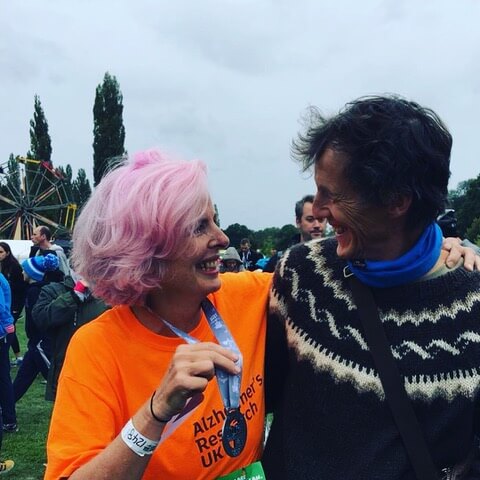Triathletes Richard & Mary aren’t letting Alzheimer’s disease break their stride
Together they are keeping fit by training for super sprint triathlons, helping to raise money for Alzheimer’s Research UK.
 |
Richard was 57 when he was diagnosed with Alzheimer’s disease. As a successful landscape architect running his own business, the diagnosis came as a complete surprise following an amyloid PET scan to rule out Early Onset Alzheimer’s Disease. Richard’s wife Mary recognises in hindsight, that there were signs of the disease presenting 10 years prior to the diagnosis as she learns more about the disease and the early symptoms.
|
Following the diagnosis, a family friend gave a newspaper advert to the couple about Re:Cognition Health’s final phase clinical trials for Alzheimer’s disease. This prompted Richard and Mary to attend a presentation to learn more about the research being undertaken in the UK. They signed up to participate in the study at the Guildford Clinic in 2016 and haven’t looked back.
Clinical trials provide access to new treatments for Alzheimer’s disease
Richard and Mary realised that there was very little in the way of medical help for patients living with Alzheimer’s disease. They felt that by participating in a clinical trial they could contribute to the the development of trailblazing new treatments.
It’s been fantastic for us both. Having constant monitoring and communication with leaders in the research field makes us feel that at the very least we are getting clear up to date information about the disease
Mary comments that the community atmosphere present as part of the clinical trial ensures that “you never feel alone”.
An individual contribution with a phenomenal global impact
On the types of research opportunities available, she notes: “The trials are varied too. From phase 3 drug trials to short lifestyle questionnaires – it’s all a valuable contribution to making the ‘big picture’ and we are delighted to be contributing to this.”
Mary acknowledges that it’s hard caring for a husband with Alzheimer’s disease and has learnt a new level of patience. “I read an awful lot about the disease and the only conclusion I came up with is that it affects everyone differently.”
Mary’s advice to others in a similar position who are caring for a loved one with Alzheimer’s disease:
Take time to adjust
Firstly, take time to adjust to the reality of having this diagnosis. It’s a devastating shock to know your hugely loved partner, dad, friend is going to slowly mentally deteriorate in front of you and there is very little one can do to help, except care for them.
Breathe and look after the family members as it affects everyone in different ways. Really take care of yourself. I have become a bit obsessed with my own health because I need to be fit to look after Richard.
I’ve given up all alcohol – as I was beginning to like it a bit too much! I’ve taken up regular exercise and lost a lot of weight. I’m basically stacking the cards in my favour to keep well enough to ‘care’.
Don’t think that your journey will be the same as everyone else’s. I don’t read those grim books or dwell on the miserable pictures. One positive result of this is that I am able to focus on something that we all should: live each day as if it were your last.
Every good experience, a lovely meal, a smile, a squeeze of the hand, a loving look, they all become so much more poignant and treasured.
Continue with normal routine
It’s hard not to label somebody as disabled when you know they are headed that way, but try to carry on with normal tasks and routine. This can help with confidence and give the person a sense of purpose. I still ask Richard to go to the shops sometimes, knowing he’ll come back with crazy ‘bargains’, but he likes going and it’s great for his morale.
Get involved with clinical trials
I would also advise anyone with this diagnosis to get involved with clinical trials. There are many benefits for everyone. Feeling cared for by top medical professionals is good. I don’t think we are going to miss out on medical breakthroughs. I can also bypass getting excited by tabloid ‘cures’ as I will know about any realistic breakthroughs before the Red top newspapers!
There’s a lot of rubbish information out there regarding cures and supplements. I feel I have good guidance about this from the experts.
All medical expenses and consultations are paid for on clinical trials. It’s completely free to participate and you really do receive the very best level of private health care.
Don’t be afraid to talk about the disease
I also feel that talking about the disease when necessary is important. I never pretend that Richard doesn’t have it. For example, if he’s having difficulty making a decision in a shop or restaurant I might quietly tell the assistant of his condition. It’s amazing how many people have had training to cope with dementia sufferers and the support that is given. It’s really impressive.
Practice patience
The overriding advice that I can give however, is to practice patience and learn to ‘accept’. I find this hard as I am very goal-orientated and have always been busy, busy, busy! I now have to learn to just let things go, to not care about things being left undone or unfinished. That’s hard.
Mary will be competing in the Super Sprint Triathlon at Hever Castle to raise money for Alzheimer’s Research.
 Visit our USA website
Visit our USA website





